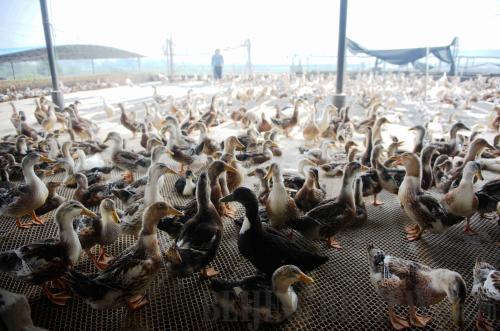|
 |
|
POULTRY BUSINESS: A family farm raises ducks in Yatang Village in Qinzhou, Guangxi Zhuang Autonomous Region (ZHANG AILIN) |
Tech-intensive
"Land transfers and scaled management that feature more reliance on technology should be encouraged, as they can reduce extensive reliance on labor," Duan said.
"The problem of labor shortages in rural areas can be largely remedied if trial programs for family farms are successful," said Liu of the New Hope Group, adding that the system could provide greater security for those who depend on the agricultural industry.
"'Family' or 'specialized' farms centralize distinct plots of land to form a large-scale operation. Family farming is similar to a fixed profession, such as that seen in Western countries," explained Guan Ruijie, an official with the MOA.
"Different from traditional large households, family farms focus more on technology and management," Guan said. "A family farm is owned and operated by one family. In China, it should also refer to one that is of a considerable scale and can ensure a family's employment of primary manpower," said Dang Guoying, a senior researcher with the Institute of Rural Development under the Chinese Academy of Social Sciences.
Dang believes that at China's present stage, the general labor force of family farms should consist primarily of rural residents, while the progress of this farming format will encourage the transfer of arable land. Through mergers and expansion, some farmers will be able to rise to the level of agribusiness professionals. The transformation to family farms can increase farmers' income and at the same time boost agricultural modernization.
Dang said, "Under good market conditions, the main restriction on a farmer's income depends on the scale of agricultural production. Increasing the scale of each farmer's agricultural production could steadily improve the standard of living for rural people."
A rough calculation suggests China has to reduce its number of agricultural households to 30 million so as to ensure that rural residents' income will be on par with that of urban citizens, taking into account the continuous rise of the average urban income, according to Dang.
"The math further indicates family farms will have to operate at least 4 hectares of arable land on average to meet the criteria after any merger," he said.
While encouraging the development of scaled family farming, the government has also expressed worry about non-agricultural development of arable land.
This year's top document said the government won't encourage businesses to rent large areas of farmland over a long period. It will tighten thresholds and establish a supervision system for industrial and commercial enterprises that rent farmers' land for agricultural production.
In recent years, non-agricultural businesses have shown growing enthusiasm in investing in agriculture as the Central Government increased support for the sector. Song Hongyuan, a researcher with the Research Center for Rural Economy affiliated with the MOA, said that the government must heighten vigilance against the use of farmland for non-agricultural purposes, adding that all legal land transfers should be done on a voluntary basis by farmers.
According to the MOA, local governments are encouraged to take the lead in formulating their own standards for family farms and introducing preferential policies in terms of land rent, financing, insurance, tax and so on.
| 